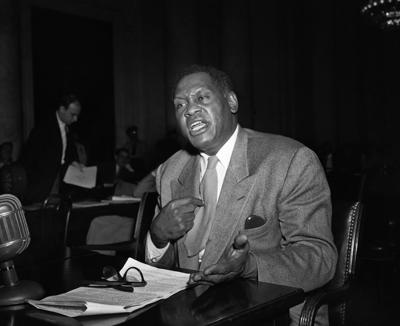Almost a century ago, on Nov. 19, 1922, a crowd of 6,500 Milwaukeeans gathered at the city’s Athletic Park to cheer on the Milwaukee Badgers as they took on the Oorang Indians in a big game for the young National Football League.
Playing for the Indians was Jim Thorpe, the winner of two gold medals at the 1912 Summer Olympics (in the classic pentathlon and the decathlon). Thorpe had distinguished himself as one of the most versatile athletes in American history: playing professional baseball, basketball and football. A member of the Sac and Fox Nation, he took the field in 1922 with the Indians, a team made up entirely of Native American players for which he was both a star player and a coach.
Playing for the Badgers was a law student named Paul Robeson, who had already earned recognition as a two-time All-American while playing as the first Black member of the Rutgers college football team, and who would go on to become an internationally renowned singer, actor and political activist.
A scholar-athlete, Robeson graduated from Rutgers and enrolled at Columbia Law School. To help pay the bills, he played professional football on the weekends initially — commuting from New York City to play with the Akron Pros. When Fritz Pollard, the pioneering Black player and coach, moved to the Badgers, Robeson followed him to Milwaukee.
Robeson could not commute to Milwaukee from New York, so he took a break from Columbia and, according to the Milwaukee Journal, had by the fall of 1922 “taken up a course of review and research work in Marquette University School of Law, preparatory to taking the New York state bar examinations late this year.”
While keeping up with his exam preparation, Robeson was a star on the football field. That was certainly the case in November 1922, when he scored two touchdowns for the Badgers — the second after he caught the ball in heavy traffic and then ran for 20 yards past an agile defense that through much of the game included Thorpe.
With Robeson’s touchdowns, the Badgers won 13-0, according to a detailed recounting of the game by sports blogger Keith Yowell.
Thorpe would go on playing professional football and other sports. But Robeson returned to New York, graduated from Columbia and, by 1924, he was starring in Eugene O’Neill’s “All God's Chillun Got Wings,” a play that sparked intense controversy because of its portrayal of an interracial marriage at a time when the Ku Klux Klan had become a powerful force not just in the south but in northern states as well.
Robeson, who had faced down racists throughout his academic and athletic careers, was prepared for the controversy and those that followed. He became one of the most ardent advocates for racial, social and economic justice in a deeply divided United States and for the international anti-fascist and anti-imperialist struggles of the decades before and after World War II.
An outspoken critic of racism and unfettered capitalism, Robeson declared that: "We in America do not forget that it was on the backs of the white workers from Europe and on the backs of millions of Blacks that the wealth of America was built. And we are resolved to share it equally.”
Even as Robeson’s stage performances earned him international acclaim, his activism would attract FBI surveillance and increasingly fierce denunciations because of his Cold War-era advocacy for peace with the Soviet Union. This led to another Wisconsin connection for Robeson — he became a target of the anti-Communist Red Scare assault on freedom of expression in the United States led by the state's U.S. Sen. Joe McCarthy.
Labeled a subversive, blacklisted from performing in the U.S. and denied a passport to travel to Europe — where he was revered as a singer and stage actor — Robeson spent the better part of the 1950s as an outcast. Histories were rewritten to deny his accomplishments, as McCarthy and his henchmen refused to acknowledge that the target of their wrath was a football “All-American.”
Yet Robeson never backed down.
In 1951, in the midst of the Red Scare, he presented the United Nations with the Civil Right Congress’ 237-page petition titled "We Charge Genocide,” that documented the record of lynching, mass incarceration, segregation and economic discrimination that oppressed Black people in the United States.
“The oppressed Negro citizens of the United States, segregated, discriminated against, and long the target of violence, suffer from genocide as the result of the consistent, conscious, unified policies of every branch of government,” declared the petition. “If the General Assembly acts as the conscience of mankind and therefore acts favorably on our petition, it will have served the cause of peace.”
The General Assembly did not act. But the point was made. At the same time that McCarthy dishonored Wisconsin with his lies, Paul Robeson, who was briefly a Milwaukeean, countered those lies with a truth that we must keep telling.






